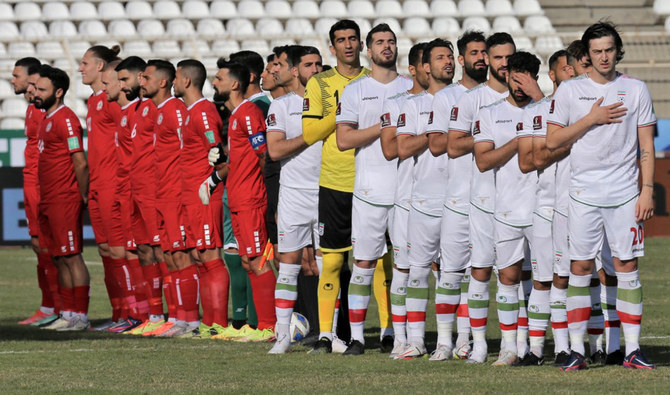
by arabnews.com — Najia Houssari — BEIRUT: The Iranian national football team has visited Lebanon on several occasions to compete in the Asian qualifiers. But this week, the Iranian team arrived in a very different set of circumstances, playing Lebanon on Thursday amid a wave of political quarreling and accusations that Tehran is taking over the country and isolating it from its Arab surroundings. The match, which Iran won 2-1, had sparked a renewed sense of patriotism among the Lebanese for the World Cup 2022 qualifiers. The Lebanese goal, scored in the first half, put a smile on the faces of the Lebanese, who are drowning in misfortunes. But while the match sparked national pride among Lebanese supporters, many created fake social media accounts to support the Iranian team and the Wilayat Al-Faqih, the term used to describe the system of governance that Tehran has used since the 1979 Islamic revolution. Although most fans admit that the Lebanese team “lacks equipment, training, physical fitness, and overall readiness due to the financial, economic and institutional crises in Lebanon,” their hearts, as they said, are with the “Cedar men.” Even politicians encouraged the Lebanese national team.
Independent MP Fouad Makhzoumi wrote: “The hearts of all the Lebanese are with our national football team.” Activist Mounir Khater tweeted: “The vast majority of the Lebanese are united behind their national football team. The Lebanese love their country, except for a few whose minds have been plagued by ignorance, and the national concept has mixed with the sectarian concept.” The game took place at the Rafic Hariri Municipal Stadium in Sidon, southern Lebanon, but FIFA and the Asian Football Confederation ruled that fans were not allowed “for security reasons.” Sports experts regretted that this measure deprived the Lebanese team of its “motivation factor.” No television channel covered the game, with fans only able to watch it live on YouTube. FIFA consulted a private security company that had recently conducted an assessment of the security situation in Lebanon. “The report was based on the Tayouneh incident that took place in October,” said Hashem Haidar, head of the Lebanese Football Association.
The Ministry of Youth and Sports addressed a letter to FIFA stressing “the stability of Lebanon and the possibility of allowing fans to attend the game,” but to no avail. Outside the stadium, the Iranian-Lebanese sporting face-off took an entirely different turn. Hezbollah’s Al-Manar TV tried to please the anti-Hezbollah Lebanese audience by wishing the Lebanese team success. Meanwhile, an online account with the name Abu Ali Qobeisi called for a gathering in Beirut to support the Iranian team. “Good luck to the Lebanese team against the Iranian occupation,” an activist tweeted. Another said: “How shameful and despicable are people from the so-called Islamic resistance environment affiliated to the Hezbollah gang in Lebanon who are encouraging the Iranian team in a game against the Lebanese team, of which we are proud. “What a bunch of malicious spies. Lebanon will forever be number one.”
Political activist Carlos Nafaa said: “If Lebanon were to score against Iran, Hezbollah would file a request to dismiss the referee,” in reference to the numerous requests to dismiss Tarek Bitar, the judge leading the investigation into the Beirut port blast, whom Hezbollah has accused of “politicizing the probe.” When the Iranian players arrived at Beirut airport two days ago carrying large amounts of luggage, some Lebanese said that their bags could contain “weapons or cash for Hezbollah since the team’s short stay does not require that many bags.” This prompted the interior minister to ask airport security to “investigate the luggage and submit a detailed report in order to take appropriate measures in this regard.” Further controversy has surrounded comedian Hussein Kaouk, who has been doing sketches on Al-Jadeed TV as a Shiite young man who lives in the southern suburb of Beirut and is affiliated with Hezbollah and the Amal movement.
Since he started sarcastically playing this character, Kaouk has been heavily criticized by Hezbollah supporters, some of whom have sent him death threats. Hezbollah Secretary-General Hassan Nasrallah gave a speech before the football match ended during which he attacked Saudi Arabia and those criticizing him in Lebanon.



